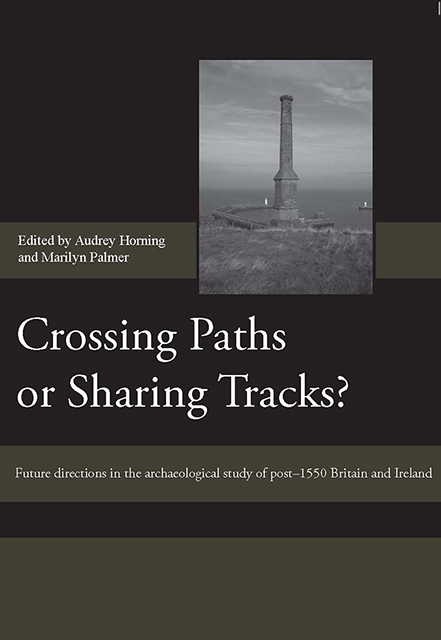 Crossing Paths or Sharing Tracks?
Crossing Paths or Sharing Tracks? Published online by Cambridge University Press: 07 March 2023
From relatively humble beginnings the subject area of historical archaeology has become established within a number of university archaeology departments on the island of Ireland. This has been largely facilitated by the work of a number of individuals and more recently by the establishment of the Irish Post-Medieval Archaeology Group (IPMAG). This chapter examines the current situation withregard to teaching provision and aspects of research, and addresses a number of issues eff ecting the future sustainable development of the subject.
INTRODUCTION
The title of this chapter borrows from Muiris Ó Súilleabháin's 1933 Twenty Years A Growing, which details life on the Blasket Islands off the south-west coast of Ireland. It was a reflection and personal memoir of the growthof community and a commentary on then-contemporary island lifeways. This short piece is a similar personal reflection on the emergence and subsequent development of post-medieval or historical archaeology on the island of Ireland and an overview from a university perspective of where the subject stands today. It must be stressed that this piece represents a snapshot in time of the state of the subject and is likely to be dated within a year or two. Nevertheless, it is valuable to begin develop a retrospective view at this important juncture, given that historical archaeology will develop further in new and exciting ways over the coming years. One quick comment is also probably required here about terminology. The descriptor historical archaeology is preferred over that of post-medieval archaeology. The latter has been used more prevalently in Ireland, following British practice, but it is clear that archaeologists in Ireland do not confine either their practice or research in random chronologies or date frameworks that pre- or post-date arbitrary dates; for example, after 1550 or 1600. The term historical archaeology appears therefore to be more inclusive and representative of the profession and archaeological record in Ireland.
SUBJECT DEVELOPMENT
The emergence of research in historical archaeology on the island of Ireland can be traced back to the early Spanish Armada shipwreck excavations undertaken by Colin Martin and others in the late 1960s and 1970s. During the same period, Tom Delaney began a series of important rescue excavations at Carrickfergus in 1970s, while Nick Brannon initiated a number of innovative investigations on a series of post-medieval sites across Northern Ireland.
To save this book to your Kindle, first ensure [email protected] is added to your Approved Personal Document E-mail List under your Personal Document Settings on the Manage Your Content and Devices page of your Amazon account. Then enter the ‘name’ part of your Kindle email address below. Find out more about saving to your Kindle.
Note you can select to save to either the @free.kindle.com or @kindle.com variations. ‘@free.kindle.com’ emails are free but can only be saved to your device when it is connected to wi-fi. ‘@kindle.com’ emails can be delivered even when you are not connected to wi-fi, but note that service fees apply.
Find out more about the Kindle Personal Document Service.
To save content items to your account, please confirm that you agree to abide by our usage policies. If this is the first time you use this feature, you will be asked to authorise Cambridge Core to connect with your account. Find out more about saving content to Dropbox.
To save content items to your account, please confirm that you agree to abide by our usage policies. If this is the first time you use this feature, you will be asked to authorise Cambridge Core to connect with your account. Find out more about saving content to Google Drive.